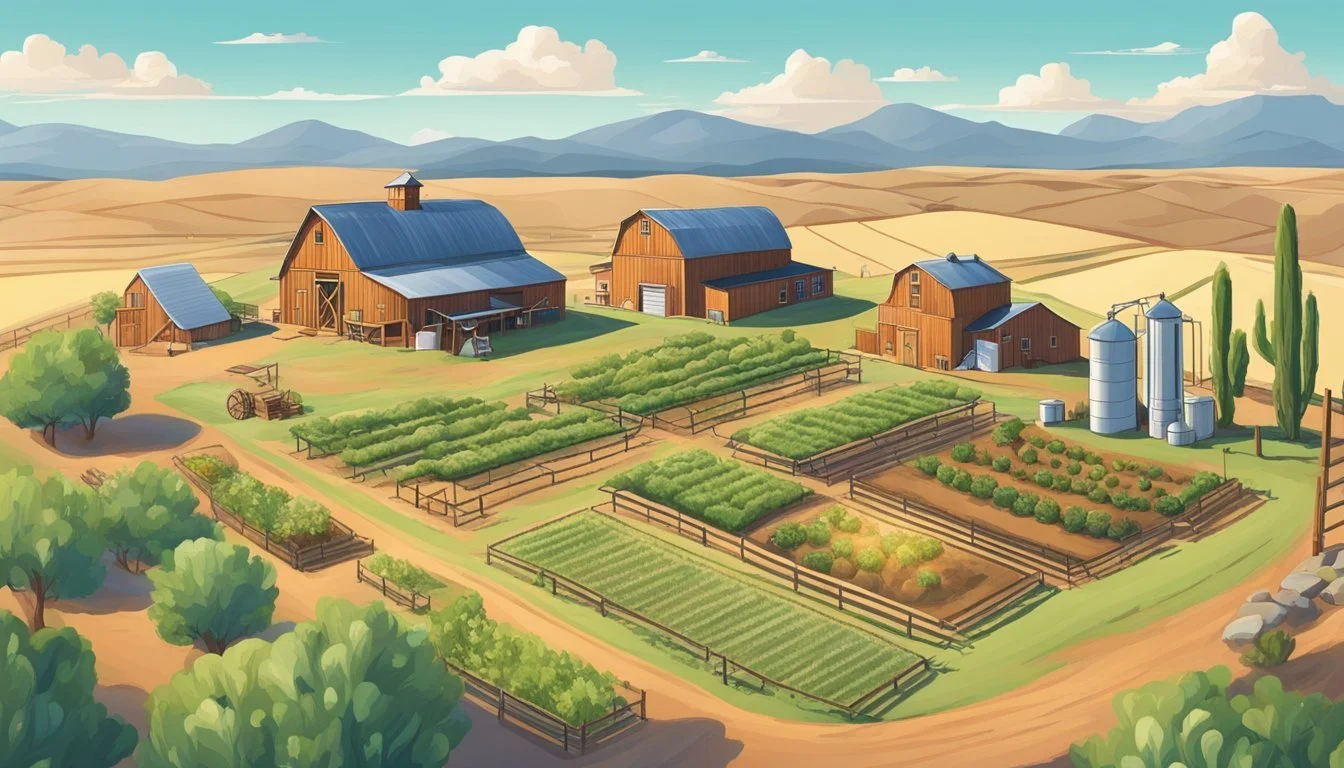Small Farms for Sale in New Mexico
A Buyer's Guide to Local Agribusiness Opportunities
This Article is Part of State-by-State Guide to Buying Your First Small Farm
With a diverse range of climates and soils, New Mexico offers ample opportunities for small-scale agriculture. Small farms for sale in the state provide prospects for aspiring farmers and investors interested in a rural lifestyle or agricultural ventures. These farms, ranging in size and featuring various types of land, including grassland, irrigated fields, and even woodland, deliver a versatile platform for different farming practices, from traditional crop farming to ranching and organic farming.
The market for small farms in New Mexico showcases properties that cater to both seasoned farmers looking to downsize and novices eager to begin their journey in agriculture. Prospective buyers can find farms with established infrastructure, including irrigation systems, fencing, and housing, as well as undeveloped land that offers a blank canvas to cultivate according to one's vision.
The availability of these small farms underscores New Mexico's commitment to supporting its agricultural sector. These farms are not just residential spaces but are integral components of local food systems, contributing to the state's economy and community well-being. With a variety of price points and locations, such as the fertile regions of the Rio Grande Valley or the tranquil expanses of eastern New Mexico, these small farms present a unique chance to be part of New Mexico's rich farming heritage.
Overview of Small Farms in New Mexico
New Mexico's landscape is diverse and offers an array of small farms, ranging in size from a few acres to several hundred acres, appealing to a variety of agricultural interests.
Popularity of Small Farming in New Mexico
Small farming is a growing trend in New Mexico, offering an accessible entry point into agriculture for newcomers and a sustainable lifestyle for seasoned farmers. The state's small farms are known for their manageable acreage that allows for a variety of farming practices, from organic vegetable gardens to boutique livestock operations.
Benefits of Owning a Small Farm
Financial Accessibility: Compared to larger agricultural operations, small farms typically require less capital to acquire and maintain.
Diverse Agriculture: The size of these farms permits a mix of crops and livestock, enhancing the soil and reducing the risk of total crop failure.
Community Support: There is a strong local food movement in New Mexico, where small farm owners can tap into community-supported agriculture programs and farmers' markets.
Lifestyle: Owners often appreciate the slower-paced, rural lifestyle that small farming affords, along with the connection to nature and personal satisfaction of land stewardship.
Key Considerations When Buying a Small Farm
When purchasing a small farm in New Mexico, buyers should diligently review zoning laws, understand water rights, and assess soil quality—all critical for ensuring the viability and legality of their farming operations.
Understanding Zoning Laws
Zoning laws dictate how a property can be used. Prospective buyers should verify that the property's zoning aligns with their intended use. For instance, Sandoval County has properties that could be zoned differently than those in Valencia County, affecting the types of farming activities permitted.
Check: Contact local planning office
Confirm: Alignment with farming goals
Note: Possible restrictions or permits needed
Water Rights and Irrigation
In New Mexico, water rights are a pivotal consideration due to the arid climate. Water rights may need to be transferred with the sale of the property, and it's essential to know the farm's irrigation capabilities.
Inquire: About existing water rights
Review: Irrigation systems and potential modifications
Determine: Water availability for specific crops or livestock
Soil Quality and Land Management
Soil quality directly impacts what can be grown and how well it will prosper. Buyers should analyze soil data and understand how previous land management practices may affect future farming.
Acres: Size impacts management complexity
Assess: Soil type and health
Plan: For proper nutrients and erosion control strategies
Finding Small Farms for Sale
When searching for small farms for sale in New Mexico, potential buyers have several resources at their disposal, ranging from real estate listings to local community platforms.
Real Estate Listings and Agents
Real estate listings are a primary resource for discovering farms available for purchase. Websites like LandSearch and realtor.com® feature multiple properties, providing detailed information including size, price, and location. Agents specializing in rural and agricultural properties can offer tailored recommendations and insights into the local market dynamics of New Mexico's diverse regions.
Example Listings:
San Juan County: A 17.4-acre farm, including a home of over 4,000 square feet.
Valencia County: A smaller 14-acre set-up, equipped with a sizable residence.
Online Marketplaces and Auctions
Online marketplaces expand the search beyond traditional listings, introducing potential buyers to auctions and direct seller listings. These platforms often carry a multitude of listings in regions like Eddy and Sandoval County, allowing buyers to compare different types of farms across New Mexico.
Local Community Boards
Buyers seeking a more personal touch to their search can explore local community boards and physical advertisements in the areas of interest. These local resources can sometimes present unique opportunities not listed on larger platforms, like a family-owned farm being sold directly by the owner.
What to Watch for:
Local listings for areas such as Santa Cruz and Peña Blanca.
Community events in New Mexico that may function as networking opportunities for farm sales.
Financial Aspects of Purchasing
In the realm of purchasing small farms in New Mexico, financial preparedness is crucial. Buyers should understand the costs associated with acquiring land, including the price per acre, financing options, and ongoing operational expenses.
Determining Your Budget
An individual's budget is the foundation of any real estate transaction. In New Mexico, prices for small farms can vary widely, with current listings showing properties ranging from $135,200 for 2 acres to $640,000 for 16 acres in Sandoval County. Buyers must assess their financial situation, considering both initial purchase cost and potential land value appreciation.
Exploring Financing Options
Traditional financing through banks or credit unions is commonly sought by purchasers. However, unique to land purchases, buyers may also find owner financing opportunities, such as the listed 0.5-acre plot in Rio Rancho, offering a sale price of $7,949 or monthly payments of $129.00. This can be particularly appealing for buyers who may not qualify for conventional loans.
Calculating Operation Costs
Running a farm involves various expenses that need careful consideration. Costs can include, but are not limited to:
Property taxes
Farm insurance
Utilities
Maintenance of facilities
Livestock care (if applicable)
Crop production costs
Buyers should calculate these operation costs based on the size of the farm in acres, as larger properties will generally incur higher expenses. It's important for the buyer to thoroughly research these costs relative to the specific farm size and intended use.
Legal and Regulatory Compliance
Acquiring a small farm in New Mexico involves a series of legal procedures and regulatory standards to ensure the transaction complies with state requirements. These processes safeguard both the buyer and seller, establishing clear ownership, financial responsibilities, and adherence to agricultural regulations.
Property Inspections and Appraisals
Prior to purchase, properties must undergo thorough inspections and appraisals to assess their condition and value. In New Mexico, inspections can include verification of water rights, land use capability, and environmental assessments. These reports influence the value of the property and are foundational for honest negotiations.
Understanding Tax Implications
Purchasers should familiarize themselves with the tax implications associated with owning farm land in New Mexico. This includes property taxes, potential agricultural tax benefits, and any applicable estate taxes. It is prudent to consult with a tax professional who specializes in farm properties to optimize tax responsibilities.
Navigating Contracts and Titles
The finalization of a farm sale in New Mexico is contingent upon a clear title and a legally-binding contract. This involves:
A title search to ensure there are no liens or encumbrances.
Review of deed restrictions or easements that may impact the use of the property.
Careful examination of the purchase agreement, which should detail all terms, conditions, and contingencies of the sale.
Attorneys or real estate professionals with expertise in agricultural property should be consulted to navigate this complex process. This helps in preventing potential legal issues in the future.
The Buying Process
When purchasing a small farm in New Mexico, the buying process involves several critical stages, from making an initial offer to the ultimate closing of the deal. Understanding the subtleties of each step can help ensure a smooth transaction and secure the desired acreage.
Making an Offer
Once a buyer identifies a suitable property, they need to make a formal offer. This typically involves drafting a written proposal that includes:
The offered price for the farm
Proposed terms and conditions
Earnest money deposit to show commitment
Specified timeframe for the seller to respond
It's important for the offer to include the exact acreage as listed to avoid any discrepancies later on.
Negotiation Strategies
Successful negotiations ensure that both parties come to a mutually beneficial agreement. Key strategies during this phase should include:
Conducting thorough research on comparable farm sales to determine a fair price
Being prepared to compromise on certain aspects
Communicating clearly and promptly with the seller or their agent
Prioritizing must-have features, such as water rights or specific acreage
Buyers should stick to their budget while also being considerate of the seller's perspective.
Closing the Deal
Completing the purchase involves a comprehensive review and signing of documents. This final stage often includes:
Obtaining a title search to confirm ownership and acreage
Having a property inspection to assess the condition of the farm
Reviewing and agreeing to the terms of the sale contract
Transferring the final payment in exchange for the deed to the property
Closing the deal successfully means meticulously going over all details pertaining to the acreage and other critical aspects of the property before finalizing the transaction.






